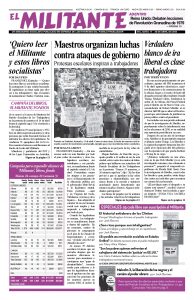Sankara, a play written and directed by Ricky Dujany, 2018, ran at London’s Cockpit Theatre from March 20 to April 14.
AND ÖGMUNDUR JÓNSSON
LONDON — Our congratulations to Ricky Dujany, who wrote and directed the play “Sankara,” as well as the fine performances by the cast and the band who presented it. They movingly presented the revolutionary political life and contributions of Thomas Sankara, who led the popular revolution that put the toilers in power in Burkina Faso from 1983 to 1987. The play has a powerful resonance in today’s crisis-ridden world.
“I was amazed by what the Burkinabè Revolution did in such a short time, and by Sankara’s insistence on taking everything back to the people,” Elise Kitson told the Militant after seeing the play.
The play provides a vivid introduction to the revolution in Burkina Faso, its power and accomplishments, and to the communist political leadership of its president, Thomas Sankara.
We learn from Ike Chuks, who plays the title role, that freedom cannot be granted, it must be conquered; that the goal of the revolution consists in having the people assume power; that through revolution, the toiling masses were both changing the world in which they lived and transforming themselves in the process; and that there could be no social revolution without the liberation of women.
The Burkinabè Revolution
Formal independence from French colonial rule of this backward, largely rural country, which had an illiteracy rate of over 90 percent and strong remnants of pre-capitalist social relations, was established in 1960. In the words of Sankara’s character, the revolution means “liberating ourselves from the forces who have dominated our country during 23 years of French neocolonial rule.”
Playwright Dujany makes extensive use of quotations from the revolutionary leader, taken from Thomas Sankara Speaks, published by Pathfinder Press. He invited Pathfinder to staff a book table and attractive photo display in the theatre lobby at every performance, and at a pre-play seminar.
Audiences topped 2,000. They were inspired to find out the whole story about the Burkinabè Revolution. Of the 600 Pathfinder books bought, some 450 were by Sankara.
Dujany’s imaginative use of video helps the play give a picture of the participation of millions of toilers in the revolution — in mobilizations, in voluntary work, and participating in the work of the Committees for Defense of the Revolution. The CDRs are the “authentic organization of the people for wielding revolutionary power,” Sankara said, “the instrument the people have forged in order to take genuine command of their destiny and thereby extend their control into all areas of society.”
With broad support the popular revolutionary government abolished tribute payments and compulsory labor services to village chiefs; nationalized the land to advance agrarian reform; launched tree-planting and irrigation projects to increase productivity and stop the advance of the desert; made basic health care and immunization available to millions.
Literacy campaigns, including in the country’s indigenous languages, were launched. Trusting in the morality and revolutionary justice of the toiling majority, the government set up popular courts to try former leaders and high officials accused of corruption. To this day, Sankara’s campaign against corruption and privilege is celebrated far and wide.
Women were encouraged to fight for their emancipation. The government took concrete steps, brought home in a comic scene where male ministers — played by Clovis Kasanda and Yinka Ayoni — nearly fall off their chairs when they hear that not only has a woman been appointed as one of their peers, but that she is paid the same as they are! Later on, men go to the food market to join in the “day in solidarity with housewives,” while their spouses take a day off.
Speaking to several thousand women on International Women’s Day in 1987, Sankara insisted that the “revolution cannot triumph without the emancipation of women.” The speech is included in Thomas Sankara Speaks and in Women’s Liberation and the African Freedom Struggle also published by Pathfinder.
The play attracted audiences drawn from around the country and even from abroad. “All through the play I was thinking I must find out more about the revolution,” said Paris Williams. “I really enjoyed the scene in which Sankara explains Burkina’s debt slavery,” said Kumail Jaffer, a student at Warwick University.
In that scene Sankara offers some dates to French President Francois Mitterrand, played by Rufus Graham. Mitterrand eats the dates and Sankara demands their return. It’s an amusing way to explain how the imperialist powers use the debts of semicolonial countries to maintain their subjugation.
We also see Sankara in Ethiopia, at an Organization of African Unity conference where he issues a call for forming a united front against the Third World debt.
Sankara’s remarks there show his ability to act as a “tribune of the people.” The Sankara-led revolution in Burkina Faso was at the disposal of the world’s toilers.
The revolution overthrown
The play depicts the political divergence within those who had led the revolution, an increasingly fundamental split that ultimately led to a counterrevolutionary coup, and Sankara being assassinated along with 12 of his comrades on Oct. 15, 1987. Coup leader Captain Blaise Compaoré, played by Chris Machari, then unleashed a reign of terror against the population. He held onto power for the following 27 years.
In explaining the coup, the play exposes — at times with humor — the machinations against the revolution by French and U.S. imperialism, and of the rulers of the Ivory Coast, where hundreds of thousands of Burkinabè worked. Ultimately class forces described by Sankara as “the enemies of the people” — both inside and outside the country — whose property and class domination were threatened by the deep-going revolution, were responsible for its overthrow.
The play explains how Compaoré increasingly pressed for an accommodation with imperialism, saying that loans and trade agreements were the only way to advance. Sankara, to the contrary, saw deepening the revolution and linking it up with the world was the way forward. Above all he saw the toiling majority as actors — “the people, always the people,” he would say.
Borrowing from Shakespeare’s “Julius Caesar,” Dujany shows this growing division by depicting Compaoré as Brutus, increasingly seduced by a combination of the untold riches of the capitalist class and world imperialism. He turns against Caesar — Sankara — and murders him, bringing down the revolution.
And Compaoré’s Lady Macbeth-like Ivorian wife Chantal, played by Cherice McKenzie-Cook, is portrayed as an agent of Ivory Coast President Félix Houphouet-Boigny, played by Shereener Browne.
In the days following the counterrevolution, the Morning Star, the daily newspaper associated with the Communist Party of Britain, approvingly cited Compaoré, denouncing Sankara as a “renegade.”
“By an accident of history, this autocrat was propelled to the leadership of our revolution,” the paper features Compaoré saying, “the better to throttle it from within.”
Sankara was aware of the dangers his opponents posed. He spoke about the counterrevolutionary coup that toppled the Grenada Revolution in October 1983, when Stalinist forces murdered its central leader, Maurice Bishop, opening the door for Washington to invade.
The play concludes with the 2014 popular uprising that ousted the Compaoré regime, combining this with Sankara’s speech, “You Cannot Kill Ideas,” that he delivered on the 20th anniversary of the murder of Che Guevara. The mass protests in 2014 brought down Compaoré, but didn’t lead to revolutionary change.
The message from the play is clear — the struggle remains in front of us, for which Sankara’s political legacy is decisive.

